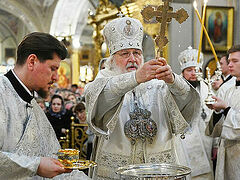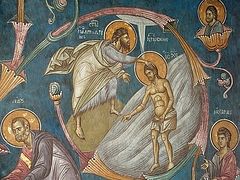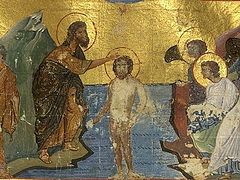Hieromonk Chrysostom (Grischenko) of the Archangel Michael-Zverinets Monastery in Kiev talks about why holy water from Theophany is like the water of Paradise and what we must remember when participating in the Mystery of Baptism or celebrating the Baptism of the Lord.
The holy apostle Peter writes that in the beginning, by the word of God, the heavens and the earth were standing out of the water and in the water (2 Pt. 3:5).
That is, in the Divine creation, water was a kind of biological matrix (in Latin, meaning “womb,” “first cause,” “primary source”), the environment for the birth and habitat for all living things. We know that man (the crown of creation) is physiologically more than eighty percent water. In the Divine plan, water is a life-creating element, but, being desecrated by impious man, water becomes a terrible, destructive element. Recall the universal flood. That it took place is today confirmed not only by Christian exegetes, but also paleontologists.
From the days of the coming in the flesh of the Lord Jesus Christ, the Church, by the gift of God’s grace, annually sanctifies water, and this water becomes a great, holy treasure.
Theophany water is the same as the waters were in the time of Adam
This water, in which God Himself is present, sanctifies everything it is sprinkled upon; it heals people from diseases. After the sanctification, this water becomes, as it seems to me, as the waters were in the Paradisaical habitations under Adam before his fall into sin. Water becomes healthy water. And for a man burdened with sin, healthy food and healthy water become healing.
I and many Orthodox Christians can attest that Theophany water (as opposed to simple water), which has been standing in their homes for a long time, preserves its freshness and coolness for a year or even more. And indeed, for those who receive this water with faith, it is healing for both body and soul.
When an Orthodox Christian participates in some feast-day events or Sacraments, he refreshes his memory. For example, when another monastic tonsure is celebrated in a monastery for one of the novices, the monks refresh the memory of their vows before God.
What should we remember when we participate in someone’s Baptism or celebrate the Baptism of the Lord?
The holy apostle Paul writes to the Galatians: As many of you as have been baptized into Christ have put on Christ (Gal. 3:27). In Baptism, we died to the ungodly life together with Christ (cf. Col. 2:12), and were raised up with Him unto a new life—life in God.
Before the coming of Christ, St. John the Baptist was baptizing people in the waters of the Jordan. People descended into these waters old, and came out new, renewed by repentance, because human sin was washed by water. But then the Lord Jesus Christ Himself came to St. John to plunge into the waters of the Jordan—not for the cleansing of sin, but to sanctify them, to transfigure them, to fill them with life. Jesus came to earth to take the sin of the world upon Himself: He hath taken our infirmities upon Himself, and borne our illnesses (Is. 53:4). And He went down into the waters of the Jordan to take upon Himself the weight of sin and death and to make the watery element an element of life again.
On healings by water in the Gospels
The Gospels describe cases of healing with the help of water. In the pool called Bethesda, from time to time an angel would descend and “trouble” the water, and whoever first stepped into the water after the “troubling” was healed (Jn. 5:2-9).
The Lord Himself used water for healing. When Jesus saw the man blind from birth, He said to him: Go, wash in the pool of Siloam (Jn. 9:7); he went, washed, and regained his sight. The Lord makes water a source of life; it truly becomes life-bearing for us, because the Spirit of God is present in it and Christ Himself descended into it in His human flesh and filled it with His Divinity. Partaking of this water, we partake of the Holy Spirit and the Lord Jesus Christ; we are united with God Himself.
Why is the Baptism of the Lord called Theophany and the Day of Light?
Metropolitan Hilarion (Alfeyev) writes: “The feast of the Baptism of the Lord is also called Theophany because at the moment of Jesus’ Baptism, for the first time in the history of mankind, all three Persons of the Holy Trinity were manifest to men. The Lord Jesus descended into the water in His flesh, the Holy Spirit descended upon Jesus in the form of a dove, and the voice of God the Father said: This is My beloved Son, in Whom I am well pleased (Mt. 3:13-17).
“In the Church typikon, the feast of Theophany is also called the Day of Light, because it is not only a feast of water and Spirit, but also a feast of Divine light, which illuminates the inner eyes of man, enlightens his heart, and transfigures all of his nature. It is that light that the Lord gives us in the Mystery of Holy Communion, in the other Mysteries of the Church, and also in the sanctification of the waters.
“After all, the consecration of water is not just a rite. Although it is not included among the Seven Sacraments, nevertheless, as in every Sacrament, there occurs a transfiguration of material, for the ordinary water that we pour from the tap is transfigured and becomes holy. As in every Mystery, there is a meeting of man with God, which means his sanctification and renewal. There occurs something much greater than what occurred with those who came to St. John the Baptist. Coming to St. John, people embraced the baptism of repentance and received the remission of sins. And through partaking of holy water, we not only receive the forgiveness of sins, but we touch the living God.”
Let us pray that on the Day of Light, we, partaking in the Great Blessing of Waters, might also partake of the Divine light, that we might be changed and transfigured. For this, in the end, is the goal of all the Mysteries, all the rites of the Church; it is the goal of our whole Christian life.
Amen.




